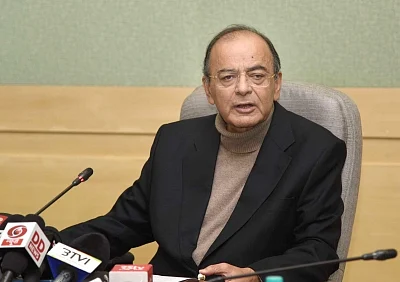New Delhi, Dec 20 (IANS) Finance Minister Arun Jaitley on Thursday said the government will infuse Rs 83,000 crore in public sector banks in the remaining part of the fiscal taking the total recapitalisation of banks during the year to Rs 1.06 lakh crore.
"Today we have asked for the parliamentary sanction for (issuing) additional recapitalisation bonds of Rs 41,000 crore... As of today, of the Rs 65,000 crore recapitalisation plan for 2018-19, Rs 42,000 crore is still remaining.
"Therefore, with this additional Rs 41,000 crore, we will now have Rs 83,000 crore for the balance year and that will make this year's recap to a total of Rs 1.06 lakh crore," Jaitley said after tabling the Supplementary Demands for Grants in the Lok Sabha.
The second batch of Supplementary Demands for Grants for 2018-19 involving a gross spending of Rs 85,948.86 crore includes the package of Rs 41,000 crore for banks. It will not require any additional cash outgo as the capital infusion is planned through bonds.
Jaitley said the distribution process for the Rs 83,000 crore capital infusion in state-run banks will be decided on the basis of performance of banks by the Department of Financial Services (DFS). About Rs 23,000 crore have already been infused this fiscal.
Capital infusion will be done under four heads to help banks meet regulatory capital norms, help better performing banks under RBI's Prompt Corrective Action (PCA) to get out of it, facilitate non-PCA banks that are near the "red-line" and to strengthen amalgamated banks.
Financial Services Secretary Rajeev Kumar said the capital infusion will help at least four of the total 11 PCA banks meet their regulatory capital norms. Overall strengthening of the banks will encourage lending and thereby economic growth of the country.
"We have made provisions to give capital to 4-5 banks (in PCA) depending on performance and on the Q2 and Q3 results. The figures will be decided (later) but there are chances that we equip at least 3 to 5 banks to meet the norms," he said.
As per the current regulatory norms, the PCA banks will have to achieve 9 per cent Capital to Risk-weighted Asset Ratio (CRAR), 1.875 per cent Capital Conservation Buffer and the 6 per cent net non-performing assets (NPA) threshold to come out of PCA and restart lending.
"About the PCA banks, the performances we are looking at is the lower level and declining trend of net NPAs, whichever PCA bank has shown better performance in terms of reduction in NPAs and the improvements in return on assets. Name of these banks will be worked out."
Kumar said there are three non-PCA banks that are near the threshold and in the danger of falling into the PCA category. These banks, including Punjab National Bank, will be provided capital to strengthen their base, he said.
There are three to four banks namely State Bank of India, Bank of Baroda, Indian Bank and Vijaya Bank that have maintained regulatory capital even higher than the prescribed minimum and would not need any capital infusion.
"The process of NPA recognition that started in 2015 is almost complete. The last quarter has showed improved performance. While recognition of NPAs peaked at 7 per cent in March 2015, it has now come down to 0.59 per cent as of September 2018," Jaitley said.
The government had initiated a comprehensive clean-up of the banking system under its 4R's approach of recognition, resolution, recapitalisation and reforms. Since 2015-16 till end of this fiscal, the total capital infusion in public sector banks will be over Rs 3 lakh crore.
"The NPAs recognition is complete, recapitalisation is in full swing, it has been enhanced further, recovery is also in full swing, the last H1 (April-September 2018) recovery is to the tune of Rs 60,726 crore," Kumar said.
The trend is likely to continue as the creditor-debtor relationship has changed because of the Insolvency and Bankruptcy Code (IBC) and debarment of the connected parties, he said.
"PSBs are showing tremendous improvement in terms of recognition, in terms of provisioning, recovery, reforms and therefore this is the time that we empower them and equip them with the capital so that the banks are ready to support the fastest growing economy," he added.
--IANS
mgu/prs
(This story was auto-published from a syndicated feed. No part of the story has been edited by The Quint.)
